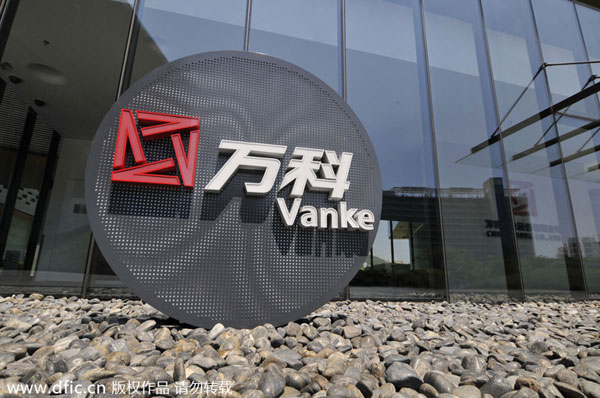 |
|
View of the headquarters of China Vanke Co Ltd in Shenzhen city, south Chinas Guangdong province. [Photo/IC] |
BEIJING - China Vanke, the country's largest property developer by revenue, posted slower profit growth in the first half of 2014 compared with robust gains in the same period last year.
Net profits edged up 5.55 percent year on year to 4.81 billion yuan (about $782 million) in the first six months, said a report on the website of the Shenzhen Stock Exchange. The growth was sharply down from a 22 percent increase in net profits in the first half of 2013.
However, the Shenzhen-based company seems to have recovered a bit from its bleak first quarter. In the January-March period, it posted a 5.23 percent year-on-year decline in profits, its first quarterly profit decline since 2002.
The company's decline in revenues also narrowed from Q1. From January to June, China Vanke reaped total revenues of 40.96 billion yuan, down 1.04 percent from a year ago, but narrowing from a plummet of 32.16 percent in January-March.
The basic earnings per share rose 6.59 percent year on year to 0.44 yuan per share.
Vanke noted in the report that H1 real estate sales across China had cooled from last year but still grew steadily compared with figures in 2012.
Despite a decline in sales on the nationwide market, the company adjusted its strategy and achieved 14.6 percent growth in total building area sold in H1, as well as a 20.6 percent increase in sales revenue, said the report.
Small apartments accounted for as much as 92 percent of the commodity housing it sold in H1, according to the report.
China's real estate firms have felt the pressure of the cooling property sector in 2014. Beijing Capital Land Limited, a Beijing-based property developer, saw its total building area sold in H1 rise only 1.1 percent from a year ago.
The sluggish growth of big-shot developers came alongside a host of disappointing indicators for the market. The growth of real estate investment continued to slow in July, latest data from the National Bureau of Statistics showed on Wednesday.
Over the past few months, an increasing number of cities saw a drop in house prices, in part due to policy loosening on purchasing rules, such as bans on second or third homes, or higher minimum down-payments.
New home prices in 55 of an official sample of 70 major cities dropped month on month in June, compared with 35 in May. New house prices fell in the first-tier cities of Shanghai, Guangzhou and Tianjin, but not in Beijing. However, used home sales declined in all four cities.
But many experts have ruled out the possibility of a "hard landing" for China's property sector. They predicted the sector would recover in Q4 as banks become more lenient on issuing loans amid sufficient credit supply.
In Sunday's report, China Vanke noted the government's fine-tuning on the once-sizzling property market has become more targeted and market-oriented.
It said the central bank stressed appropriate allocation of credit resources in May, as well as credit support for families buying first homes.
The policy means the reasonable demand for so-called "owner-occupied housing" is endorsed and protected. Such measures, the company added, would stabilize the market and help put the sector back on track.
